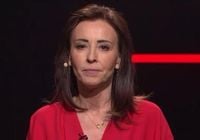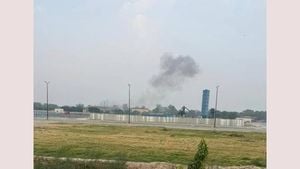In a significant development ahead of the upcoming presidential elections in Poland, major television networks TVP, Polsat, and TVN are set to organize a joint debate on May 12, 2025, at 8:00 PM. This event will invite all presidential candidates, providing a crucial platform for their views just days before the first round of elections.
The debate is to be moderated by Radomir Wit from TVN24, Piotr Witwicki from Polsat News, and Dorota Wysocka-Schnepf from TVP. However, the inclusion of Wysocka-Schnepf has sparked considerable controversy among the candidates' campaign teams. Krzysztof Stanowski, a prominent figure in the media and head of the Channel Zero, revealed that the majority of campaign teams are protesting her role as moderator, citing concerns over her perceived bias.
Stanowski reported that out of 10 to 11 campaign teams present, eight voted in favor of replacing Wysocka-Schnepf. "There was a 20-minute argument about this issue," he stated, highlighting the tensions surrounding the debate's organization. The decision from TVP regarding Wysocka-Schnepf's participation is expected on Wednesday, April 30, 2025.
The upcoming debate is particularly notable as it is the last opportunity for candidates to present their platforms before the first round of presidential elections scheduled for May 18, 2025, with a potential second round on June 1, 2025. To date, four debates have already taken place, organized by various media outlets, with the most recent being held on April 11, 2025, in Końskie, which garnered an impressive viewership of 6.22 million.
During a closed meeting on April 29, 2025, representatives from the presidential campaign teams met with the head of the Television Information Agency to discuss the upcoming debate. The topic of Wysocka-Schnepf's hosting role was a focal point of contention. Some representatives expressed disbelief that she would be chosen, given her reputation for partisanship. Zbigniew Kuźmiuk, a member of the ruling Law and Justice party (PiS), labeled her a political employee, emphasizing that her previous work does not align with the objectivity expected in a debate setting.
Mateusz Kurzejewski, who represents Karol Nawrocki’s campaign, voiced his strong opposition to Wysocka-Schnepf's involvement, branding her as the "biggest propagandist" and asserting that her presence would undermine the debate's integrity. "I expressed my concerns and received support from many teams," he noted, reflecting the widespread unease among candidates regarding the choice of moderator.
Despite the backlash, TVP has not yet publicly commented on the controversy surrounding Wysocka-Schnepf. The station's press office has indicated that more details about the debate will be provided once all arrangements are finalized.
As the election date approaches, the atmosphere is charged with anticipation and scrutiny. The debate on May 12 promises to be a pivotal moment, not only for the candidates but also for the media landscape in Poland. The choice of moderators and the conduct of the debate itself will likely influence public perception as voters prepare to make their decisions.
Looking back, the previous debates have seen varying degrees of success and controversy. The first debate organized by TV Republika and other outlets sparked discussions about fairness and representation, particularly regarding the presence of multiple candidates. The latest debate in Końskie, which featured eight candidates, was a clear indication of the growing competition and the diverse range of opinions vying for public attention.
As the candidates gear up for the final debate, the stakes are high. With various factions within the political spectrum voicing their concerns, it remains to be seen how the dynamics will play out in the upcoming discussions. The decision regarding Dorota Wysocka-Schnepf's role could very well set the tone for the debates to come, reflecting broader issues of media bias and the integrity of public discourse in Poland.
In the context of the current political climate, where accusations of bias and partisanship are rampant, the choice of moderators for such a high-stakes debate is critical. Candidates and their teams are understandably anxious about how the debate will be conducted and whether it will provide a fair platform for all voices involved.
As the clock ticks down to the debate, all eyes will be on how TVP, Polsat, and TVN navigate this controversy and whether they will heed the calls for a change in moderation. The implications of this decision could resonate far beyond the debate itself, influencing voter sentiment and shaping the narrative leading into the election.






